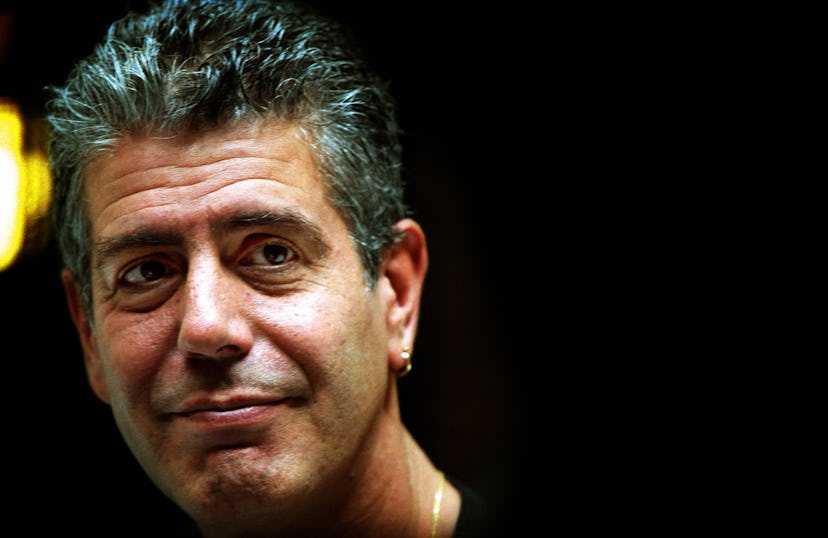How Anthony Bourdain Is Being Remembered as Everyone’s Best Friend

Anthony Bourdain wasn’t just a first-name celebrity; he was a nickname celebrity. Since his death by suicide was first reported Friday, remembrances have coursed unstemmed from social media and blogs—recounting stories of, as New Yorker food writer Helen Rosner put it, “my pal Tony.” Bourdain, by many accounts, courted an intimacy with even relative acquaintances; his “fame,” Rosner writes, “wasn’t the distant, lacquered type of an actor or a musician, bundled and sold with a life-style newsletter.”
“You had to fight through a wall of skeptical P.R. to get to someone like Guy Fieri, but Bourdain was right there, for everyone, in equal measure,” she went on. “He remembered names. He took every question seriously. He was twenty minutes early to every appointment, to the minute.” David Simon, the former journalist and creator of The Wire and The Deuce, felt he and Bourdain were “destined” to be friends, according to an essay by his wife, the crime novelist Laura Lippman, so he concocted a scheme that resulted in Bourdain consulting on Simon’s series Treme. “Maybe we all just wanted to hang out with him,” Mia Farrow wrote on Twitter.
The result, in the wake of his death, has been a collage of stories about a man who might have been the most personally beloved celebrity in America—someone about whom heads of state, food writers, and fellow chefs alike have fired off amusing, poignant, unique anecdotes about Anthony Bourdain, not a platitude among them. Here’s why.
He always suspended judgment, especially about food.
There’s a now-famous story about Bourdain, who, after reading a small-town woman’s viral review of her local Olive Garden, traveled to her home in Grand Forks, North Dakota, and agreed to publish her cookbook—and write its foreword. “He seemed to appreciate the fact that for people in middle America, it’s part of how we eat,” the woman, Marilyn Hagerty, told Time. This was, in fact, representative of his philosophy towards food: “You have disrespected your host, okay?” he told a listener, during a radio interview, who expressed resistance to trying a host’s more challenging recipes at a dinner party. “You rejected any possibility of trying something new. You revealed yourself to be an inward-looking buffoon and no one I would want to be friends with.”
He was, in many ways, America’s most beloved statesman.
With No Reservations and Parts Unknown, Bourdain made a career out of highlighting the nuance of a culture’s relationship to its cuisine. “There was something about Tony that screamed, ‘I’m not like other white people. I’m not here to laugh at you,’” Eddie Huang recalled of seeing Bourdain’s two-hour special, No Reservations: Asia, with his family in 2006. “Anthony Bourdain had one of the only shows on tv that tried with all its might to teach Americans not to be scared of other people,” reads a tweet that subsequently went viral. In 2016, Barack Obama went to Hanoi, Vietnam, to share a meal of noodles and beer with Bourdain for an episode of Parts Unknown. “He taught us about food—but more importantly, about its ability to bring us together,” Obama wrote on Twitter, captioning a photo of their dinner. “To make us a little less afraid of the unknown.”
He emerged as a staunch ally of the #MeToo movement.
In 2016, Asia Argento consulted on an episode of Parts Unknown set in Rome. She and Bourdain began dating, and, by the end of the following year, Argento had become one of the most outspoken voices of the #MeToo movement, beginning with her participation in the New Yorker story that exposed Harvey Weinstein’s predatory behavior. Bourdain consistently supported Argento on social media and in interviews; while discussing the challenges of finding a home for Parts Unknown that wouldn’t violate his self-described “‘no-asshole’ policy,” he slammed Quentin Tarantino for “living a life of complicity and shame and compromise.”
But Bourdain also turned that critical lens on himself, acknowledging, in an interview with Slate, how he had contributed, or at least inured himself, to the hyper-masculine restaurant world—he refused to take his allyship for granted. And this was something he’s been remembered for, too, this weekend: “He was my love, my rock, my protector,” Argento wrote in a statement. In her essay, Rosner recalled Bourdain’s one-time discomfort with labeling himself a feminist; at a party earlier this year, she ran into the chef, who “came up and clapped me on the shoulder. ‘Remember when you asked me if I was a feminist, and I was afraid to say yes?’ he said, in that growling, companionable voice. ‘Write this down: I’m a fuckin’ feminist.’”
The image of Bourdain that has emerged via the remembrances by friends and fans alike is one of a generous friend and uncompromising supporter of social justice in various spheres, as an antidote to xenophobia and misogyny where he saw it. The world will miss him.